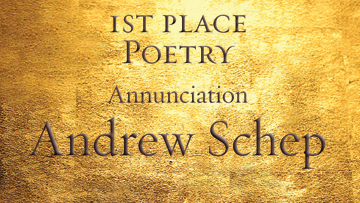You have free articles remaining this month.
Subscribe to the RP Witness for full access to new articles and the complete archives.
Annunciation
The uncreated Word spoke, and all was created.
The Lord gave the Word, and all was given—
First, your garden home, and every fruit tree for you but one;
And you last of all, a bone from the dust-made man,
My self-portrait clothed in the supple clay of flesh;
Young, a fresh, blood-beating heart—life from Life,
Matriarch of all who would live beyond the garden gate
And then return to dust.
The Word, now seeking, would speak:
Will you now give me a garden home;
Supply me now with bones, and flesh, and blood?
Will you taste your mother’s curse first for me,
Suffer the curse of stretch and push,
Suffer me to open the door of its defeat?
And will you tinge my first bath red?
Since words will exceed my skill,
Instinct must instruct you to calm my cries with your milk,
To hug me, and to swaddle me against wind and winter.
Love will lead you to carry me until I crawl,
And hold my hand until I walk and no longer fall;
And then, when you cannot walk without falling,
When you cannot fall without dying, then I will raise you up.
And I too with love will give, mother, and with pain,
I will give back blood to you from each artery and vein,
Every drop of your bath and your banquet cup.
From the flesh you feed, I will prepare your food, dear lady;
The bread of life, a better tree, lasting fruit,
A feast of aged wine and tender lamb.
But first I will watch your lips and listen as you shape words,
And I will mimic the sounds you make;
You will teach me, and in time I will form words and build sentences,
And from my mother tongue I will speak again, stronger yet—
Tell the ancient doors to be lifted up,
Command the wind and the waves to be kind to you,
And, when you are dust,
Preach flesh back on to your driest bone.
“A masterful interweaving of scriptural references is a hallmark of ‘Annunciation,’ which offers a meditation on the work of Christ viewed from the approaching relationship with the one chosen to be His mother. The poem anticipates details of all His incarnation must embrace for the sake of God’s people. Of special merit in this poetic narrative is the writer’s care to present the facts of Christ’s mission without indulging in speculative development.” —the judge
